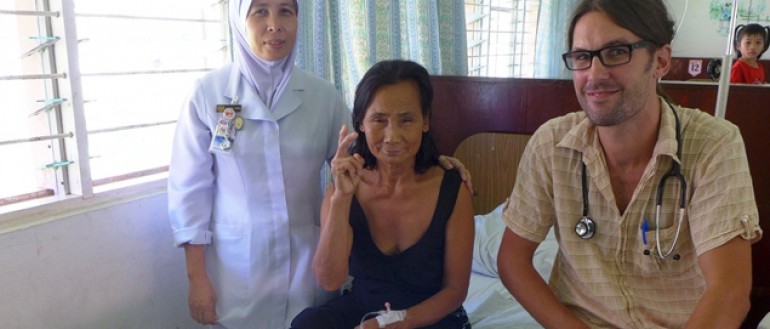Research into malaria treatment wins Harry Christian Giese – Research into Action Award
Harry Giese AM MBE (1913-2000) played a significant and formative role in the establishment of the Menzies School of Health Research from the late 1970s to the 1990s. His important contribution to health and education is acknowledged and remembered through this Award, which commenced in 2013.
Pioneering research into optimising treatment therapies for malaria is likely to benefit the millions of people worldwide who suffer from the potentially deadly disease.
PhD student with the Menzies School of Health Research, Dr Matthew Grigg, has been named the 2014 recipient of the Harry Christian Giese – Research into Action Award to champion the translation of his research findings into medical interventions.
Dr Grigg will work with a number of hospital sites, community and local government stakeholders in Sabah, Malaysia as part of his research, which seeks to inform treatment guidelines and policy for Plasmodium knowlesi and other Plasmodium species causing the disease throughout South-East Asia.
Malaria causes over 200 million clinical infections a year, and is a major cause of morbidity in the Asia-Pacific region.
Plasmodium knowlesi is a monkey malaria parasite that has recently been shown to infect humans via mosquitoes throughout South-East Asia and is now the most common cause of malaria in Malaysia.
Dr Grigg said his team’s randomised controlled trial was the first ever performed in knowlesi malaria.
“The current WHO 2010 Malaria Treatment Guidelines have no recommendation for the optimal treatment of non-severe malaria due to Plasmodium knowlesi.
“Artemisinin-combination therapies (ACT) and chloroquine have each been successfully used to treat knowlesi malaria; however, they have never been prospectively compared to see how quickly they clear parasites in the blood.”
The trial will include two drug treatment arms, with artesunate-mefloquine compared to chloroquine using current standard dosing regimens. Patients of any age presenting with malaria will be asked to enrol in the study over a two-year period at three district hospital sites in Sabah. A minimum of 228 patients will be required to evaluate the main outcome, which is a difference in the proportion of patients negative at 24 hours post-treatment.
“Misdiagnosis with other species is the key point of the study. If the drugs work at least equally well, it means we can recommend ACT as a single treatment for all malaria species,” Dr Grigg said.
“Results will be disseminated to inform knowlesi malaria treatment policy in this region through presentations to specialists and Ministry of Health officials and through peer-reviewed publications. Community and local government stakeholder meetings will be held at the completion of the study to share the results and guide state and national treatment policy. The final results will influence both national and international WHO treatment management regimes.”
Dr Grigg said he was humbled to receive an award which recognised Mr Giese, a trailblazer in Northern Territory health.
“I would like to thank the Giese family for their generous support and the selection panel for recognising a critical body of work in the fight against malaria.”

